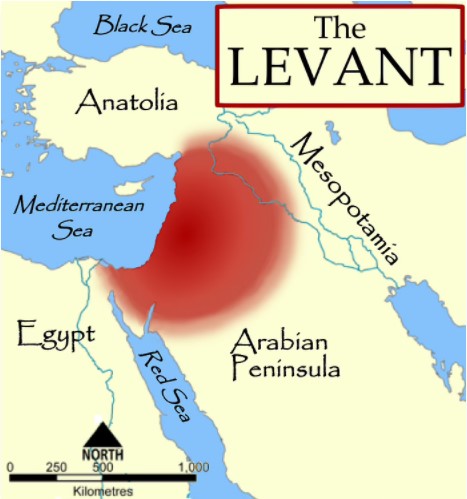The Levant is an approximate historical geographical term referring to a large area in the Eastern Mediterranean region of Western Asia. In its narrowest sense, it is equivalent to the historical region of Syria, which included present-day Syria, Lebanon, Jordan, Israel, Palestine and most of Turkey southwest of the middle Euphrates. The term entered English in the late 15th century from French. It derives from the Italian Levante, meaning “rising”, implying the rising of the Sun in the east, and is broadly equivalent to the term al-Mashriq, meaning “the eastern place, where the Sun rises”.
In the 13th and 14th centuries, the term levante was used for Italian maritime commerce in the Eastern Mediterranean, including Greece, Anatolia, Syria-Palestine, and Egypt, that is, the lands east of Venice. Eventually the term was restricted to the Muslim countries of Syria-Palestine and Egypt. In 1581, England set up the Levant Company to monopolize commerce with the Ottoman Empire.
The name Levant States was used to refer to the French mandate over Syria and Lebanon after World War I.


Hello,
I am affraid that the “Levant” philatelly is not just the geographical area you show in the map but in reality the whole Ottoman Empire (both in Europe as well as in Asia and Africa). As “Levant” stamps (until 1923, Lausanne Treaty) was used by many European states inside the Ottoman Empire accordingly with the Sultan permissions (i.e. Italy, Austria, GB, France, Poland, Romania), to operate a postal service inside the empire, using foreign stamps but in Ottoman money values (para, piastres). So, except the later supervised Anglo-French areas (Sudan, Egypt, Lebanon, Syria, Mesopotamia, Palestine) foreign Post Offices of the above refered countries existed in Constantinople, Thessaloniki, Janina, Kavalla, Smyrna, Kerasounta, etc.
thanks,
Yes – I think I will need to expand! 🙂